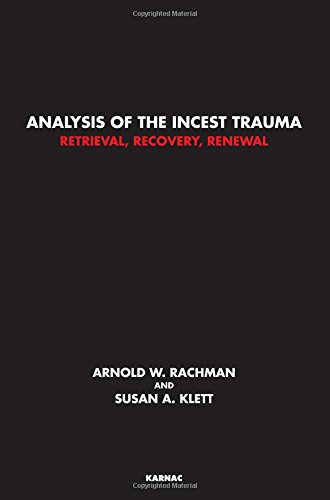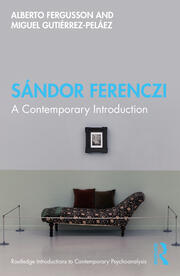Ferenczi's Confusion of Tongues Theory of Trauma: A Relational Neurobiological Perspective

Book Details
- Publisher : Routledge
- Published : September 2023
- Cover : Paperback
- Pages : 312
- Category :
Trauma and Violence - Category 2 :
Psychoanalysis - Catalogue No : 97287
- ISBN 13 : 9781032207476
- ISBN 10 : 1032207477
Also by Arnold W. Rachman
Also by Clara Mucci
There are currently no reviews
Be the first to review
Arnold W. Rachman and Clara Mucci provide a detailed examination of the significance of Sándor Ferenczi’s paradigm shifting theory of trauma, the Confusion of Tongues, and confirm its relevance for the psychoanalytic theory and analysis of trauma today.
As the first alternative to Freud’s theory of the Oedipal complex, Ferenczi’s Confusion of Tongues theory expanded the theoretical and clinical boundaries of psychoanalysis to establish that psychological trauma as a result of childhood sexual abuse and trauma experiences are a significant contributing factor to the development of psychological disorders. The authors address the lack of attention paid to the significance of sexual abuse trauma to understanding psychological ill health in psychoanalysis, and integrate the latest research on neurobiology to demonstrate how Ferenczi’s theory is meaningful to understanding many aspects of human behavior today.
This work will be formative to psychoanalysts and psychotherapists both in training and in practice and provide renewed insight into the treatment of childhood sexual abuse and psychological trauma.
Reviews and Endorsements
In Sándor Ferenczi’s Confusion of Tongues Theory of Trauma, Arnold Rachman and Clara Mucci take us into the origin and genius of Ferenczi’s concept of the “Confusion of Tongues,” Ferenczi’s insight into the trauma of child sexual abuse in the origins of psychopathology, and Freud’s campaign against Ferenczi’s ideas. The book is a rich, erudite, and close-up view into Ferenczi’s contributions and the intellectual climate of that era.
Beatrice Beebe, New York State Psychiatric Institute, Columbia University Medical Center
Rachmann and Mucci pull together in this slim heavy-hitting volume a masterful account of the complicated intense relationship between Sándor Ferenczi and Sigmund Freud. They show how Ferenczi, with his ‘confusion of tongues paradigm’ - an all-embracing term for dissociation and splitting defenses, that takes account of the disturbingly large number of adults who suffered abuse / trauma perpetrated against them by adults when they were children. Freud knew all of this in the 1890s when his ‘affect/trauma model’ of psychopathology was advanced. But Freud moved on and modified his own ideas in the direction of codifying the principle of psychosexual development and children’s incest wishes, turning his back on patients’ actual traumatic experiences. Ferenczi in the early 1920s essentially, and increasingly, feuded with Freud, or rather Freud feuded with Ferenczi who told Freud more-or-less, ‘you did your best work 25 years ago, prior to you taking a dreadful wrong turn into the psychosexual stages, and advancement of the oedipal complex as a core influence upon the child.’ For Freud, this was a threat to his authority, and Ferenczi was cast by Freud as a ‘pathological liar’ while Ferenczi perceived Freud as given to ‘emotional blindness’ with respect to the actual high level of experiences of child sexual, physical and emotional abuse among patients seeking treatment. Children are often targets of incestuous attacks, but children arguably do NOT have incestuous wishes. This painful but important chapter in the history of psychoanalysis has been reported on by others before, but Rachmann and Mucci achieve a masterful integration of sources to articulate a clinical view of trauma that resonates deeply with our contemporary world. Diverse case histories and explorations into literature (e.g. Kafka) add substance to this important volume. Social workers, counsellors, psychologists, and psychoanalysts wishing to fine tune their trauma-informed understanding will be well-served by reading this volume.
Howard Steel is professor of Psychology, director of Graduate Studies, and co-director (with Miriam Steele) of the Center for Attachment Research at the New School for Social Research, New York
This far reaching and deep exploration of Ferenczi’s classic paper, “Confusion of Tongues,” brings scholarship and understanding of this contribution to psychoanalysis to a new level of detail and specificity. A powerful addition to our appreciation of what Ferenczi has meant to psychoanalysis, and to the crucial role of trauma in character formation and development.
Adrienne Harris, faculty and supervisor at both New York University and the Psychoanalytic Institute of Northern California
Table of Contents
1. The Origin of Ferenczi’s Confusion of Tongues Concept in the Biblical Narrative of the Tower of Babel
2. Ferenczi’s Presentation of the Confusion of Tongues Paper, The 12th International Psycho-Analytic Congress, Wiesbaden, Germany, September, 4, 1932
3. Freud’s Diagnosis of Sándor Ferenczi as having a “Pseudologia Fantastica” Disorder
4. Freud's Denunciation of Ferenczi and The Confusion of Tongues: His Self Analysis, “Emotional Blindness” and Pathologizing Ferenczi
5. Traditional Psychoanalysis’s Totschweigen Campaign to Silence the Confusion of Tongues Paper
6. The Confusion of Tongues Between Freud and Ferenczi
7. Ferenczi’s Alternative Confusion of Tongues Theory: Expanding the Psychoanalytic Perspective to Include Trauma
8. Confusion of Tongues Contribution to the Evolution of Theory and Method in Psychoanalysis
9. Confusion of Tongues and the Language of Sexuality (Arnold Wm Rachman and Paul Mattick)
10. A Contemporary View of Analyzing Childhood Sexual Trauma
11. The Confusion of Tongues Between Freud and Dora
12. The Analysis Between Sándor Ferenczi and Elizabeth Severn: Origin of the Confusion of Tongues Paradigm and Trauma Analysis
13. The “Two Person Psychology”: The Necessity to Extend the Freudian Theory to the Reality of the Interpersonal Traumatic Development (Clara Mucci)
14. Three Levels of Human Agency and the Problems of the Diagnostic: Statistical DSM Categories for Post Traumatic Stress Disorder (Clara Mucci)
15. Therapy for Trauma of Human Agency: “What Has Been Damaged in a Relationship Needs to be Healed in a Relationship” (Clara Mucci)
16. The Analysis Between Sigmund Freud and Anna Freud: A Confusion of Tongues
17. The Confusion of Tongues of Mrs. Mary Rowlandson: A First Person Account of Captivity in Colonial America
18. The Confusion of Tongues Trauma In An Abducted Child: The Case of Elizabeth Smart
19. The Confusion of Tongues Trauma Between Franz Kafka and His Father
About the Author(s)
Arnold W. Rachman, PhD, FAGPA, is a Training and Supervising Analyst at the Institute of the Postgraduate Psychoanalytic Society, New York; a Clinical Professor of Psychology at Derner Institute, Adelphi University; Associate Professor of Psychiatry, New York University Medical School; on the Faculty of the Trauma and Disaster Studies Program, New York University Postdoctoral Program in Psychoanalysis; on the Board of Directors, Sandor Ferenczi Study Center, New School for Social Research; and author of: Sandor Ferenczi: The Psychotherapist of Tenderness and Passion and Psychotherapy of Difficult Cases: Flexibility & Responsiveness in Clinical Practice.
More titles by Arnold W. Rachman
Clara Mucci is a psychoanalytically oriented psychotherapist practicing in Milan and Pescara, Italy. She is Full Professor of Clinical Psychology at the University of Chieti, where she taught English Literature and Shakespearean Drama. She received a PhD from Emory University, Atlanta, and was a fellow in 2005-2006 at the Institute of Personality Disorder, New York, directed by Otto Kernberg. The author of several monographies on Shakespeare, Psychoanalysis and Literary Theory, she has taught in London (Westminster College), Atlanta, and New York (Hunter College).
Customer Reviews
Our customers have not yet reviewed this title. Be the first add your own review for this title.
You may also like
The Budapest School of Psychoanalysis: The Origin of a Two-Person Psychology...
Arnold W. Rachman
Price £42.99









